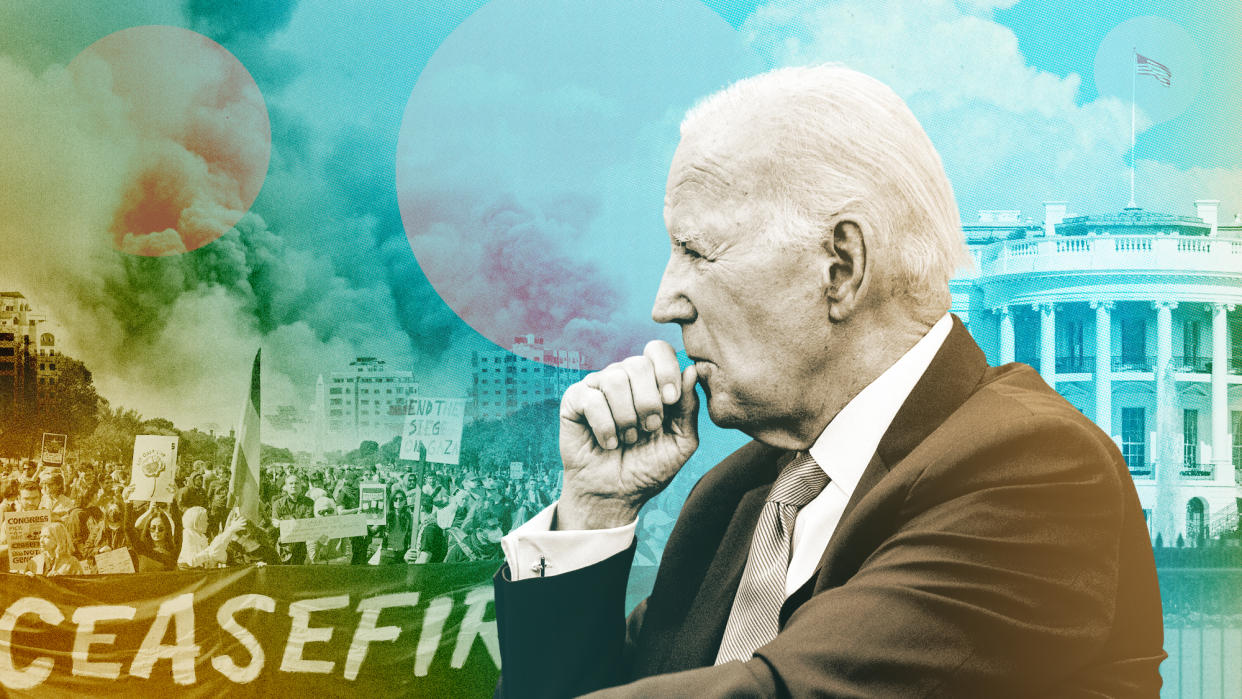Is Biden's Israel-Palestine posturing an election year risk?

- Oops!Something went wrong.Please try again later.
- Oops!Something went wrong.Please try again later.
With Israeli tanks rolling into the Gaza Strip, and warships pummeling the densely packed territory, the ongoing violence from Israeli forces and Hamas militants shows little sign of stopping after more than three weeks of horrific bloodshed across the region. Throughout it all, President Biden and his administration have stood steadfastly behind Israel, labeling Palestinians "the other team" while emphasizing Israel's justifications of self-defense and downplaying calls for a full cease-fire between the warring nations.
Although the White House's support for Israel has continued unabated in public, the administration's rhetoric has "shifted dramatically over the past three weeks" as well, with The New York Times reporting that U.S. officials have "grown more strident" in pushing Israel to avoid civilian casualties and allow humanitarian aid into the blockaded strip. It's a "shift in tone and substance" prompted by the growing crisis in Gaza, where thousands have been killed by Israeli airstrikes, and comes on the heels of pushback from within the administration itself over the White House's perceived biases towards Israel.
Voters, meanwhile, have become increasingly supportive of the Biden administration's handling of the ongoing crisis. A Morning Consult poll conducted last week showed the public "about as likely to approve of President Joe Biden’s handling of the Israeli-Palestinian conflict than they are to disapprove of it (42% to 43%)" in an "improvement" over the month. But that growing contentment is by no means universal — and as the conflict drags on, frustration and anger with the White House from key corners of the Democratic coalition could be a sign of tough times ahead for the president's reelection effort.
What the commentators said
Without a shift toward a more equitable, sympathetic stance toward Palestinians from the White House, "it'll be very difficult to mobilize the level of support for the president that we were able to do in 2020" Arab American Institute founder and president James Zogby told Haaretz, noting that Arab American and Muslim communities are often clustered in key electoral college states like Michigan and Virginia.
Already a "left-leaning coalition of young voters and people of color" has begun to show "more discontent toward [Biden] than at any point since he was elected" over his handling of the Israel-Hamas war, according to The New York Times. And while the "political power of the Israel skeptics within the party is untested," even a minor "slip in support from voters who backed him in 2020" could "throw his re-election bid into question."
As the first national poll of Arab Americans conducted since the war began shows, that slip may be underway. Conducted by Zogby's Arab American Institute, the poll shows "only 17% of Arab American voters saying they will vote for Biden in 2024—a staggering drop from 59% in 2020," Time Magazine reported. Moreover, the poll marked "the first time a majority did not claim to prefer the Democrats since the institute began tracking party identification in 1996."
While "Arab and Muslim Americans are unlikely to back Trump" they could still "sit out the election and not vote for Biden," according to Reuters. "I do think it will cost him Michigan," activist Laila El-Haddad predicted to the news service. An open letter to the administration from the National Muslim Democratic Council has already threatened to "withhold endorsement, support, or votes for any candidate who endorses the Israeli offensive against the Palestinian people," Middle East Monitor reported.
What next?
The administration has engaged in carefully choreographed outreach to the Arab American and Muslim communities recently, culminating in a meeting between Biden and five high-profile figures at the White House last week. While Minnesota Attorney General Keith Ellison, the first Muslim American elected to Congress, attended and praised the president for having "listened carefully, responded sincerely, and showed empathy and compassion for the suffering of everyone," in a statement to The Washington Post, other participants were less enthusiastic, with one telling the paper it was "a s---show."
As for holding back support for Biden, "we're not silly—we know what Trump has done to our communities" Michigan-based New Generation for Palestine president Amer Zahr told Time. However, "the policies are basically the same. Except when Trump does it, you get some pushback from the Democratic Party."

